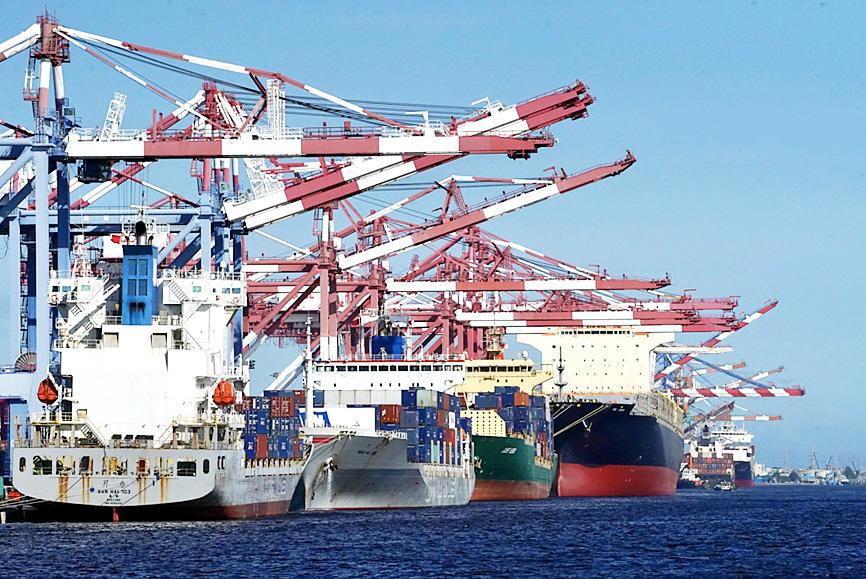Exports last month surged 35.1 percent year-on-year to US$36.65 billion, the second-highest level in history, as demand for electronics remained strong, while a low base meant that non-technology products posted faster growth, the Ministry of Finance said yesterday.
The improving global economy accounted for the impressive showing that is likely to extend into the second half of the year with the arrival of the high sales season, Department of Statistics Director-General Beatrice Tsai (蔡美娜) told an online news conference in Taipei.
“‘Hot’ is the most appropriate word to characterize the state of exports,” Tsai said, forecasting an upswing of 29 to 33 percent for this month year-on-year.

Photo: CNA
In the second quarter, exports grew 37.4 percent year-on-year to US$1.09 billion, while imports rose 36.4 percent to US$915.3 million, both beating last month’s forecasts by the Directorate-General of Budget, Accounting and Statistics.
That suggests that the nation’s export-focused economy is likely to emerge from the domestic COVID-19 outbreak unscathed, despite a sharp decline in consumer activity.
Outbound shipments of electronic products last month grew 29.8 percent to a record US$14.51 billion, as demand for chips hit a new peak, Tsai said.
Exports of optical products, including flat panels and camera lenses, rose 29.5 percent to US$1.12 billion, data showed.
Smartphone camera lens maker Largan Precision Co (大立光) earlier this week said that its sales would pick up this month after an 18.51 percent year-on-year fall last month due to the slow season and the loss of major client Huawei Technologies Co (華為).
Shipments of plastic, base metal, chemical and mineral products registered steeper growth of 46.6 to 87.4 percent, as local firms benefited from increased infrastructure spending by the US and other nations, Tsai said, adding that a low base last year also lent support.
Exports to China, ASEAN, Japan, the US and Europe all grew by double-digit percentage points as vaccination programs enabled the world to gradually shake off the threat of the COVID-19 pandemic.
Imports last month surged 42.3 percent to US$31.51 billion, giving Taiwan a trade surplus of US$5.1 billion, data showed.
Imports of agricultural and industrial materials grew 51.8 percent to US$21.95 billion, while imports of capital equipment increased 24.5 percent to US$5.5 million, the ministry said, adding that local technology firms are expanding their capacity to meet demand.
In the first six months of the year, exports advanced 31 percent year-on-year to US$206.91 billion, while imports expanded 28.6 percent to US$175.1 billion, the ministry said, while adding that uncertainty remains due to the spread of more transmissible variants of SARS-CoV-2.

UNCERTAINTY: Innolux activated a stringent supply chain management mechanism, as it did during the COVID-19 pandemic, to ensure optimal inventory levels for customers Flat-panel display makers AUO Corp (友達) and Innolux Corp (群創) yesterday said that about 12 to 20 percent of their display business is at risk of potential US tariffs and that they would relocate production or shipment destinations to mitigate the levies’ effects. US tariffs would have a direct impact of US$200 million on AUO’s revenue, company chairman Paul Peng (彭雙浪) told reporters on the sidelines of the Touch Taiwan trade show in Taipei yesterday. That would make up about 12 percent of the company’s overall revenue. To cope with the tariff uncertainty, AUO plans to allocate its production to manufacturing facilities in

Taiwan will prioritize the development of silicon photonics by taking advantage of its strength in the semiconductor industry to build another shield to protect the local economy, National Development Council (NDC) Minister Paul Liu (劉鏡清) said yesterday. Speaking at a meeting of the legislature’s Economics Committee, Liu said Taiwan already has the artificial intelligence (AI) industry as a shield, after the semiconductor industry, to safeguard the country, and is looking at new unique fields to build more economic shields. While Taiwan will further strengthen its existing shields, over the longer term, the country is determined to focus on such potential segments as

TAKING STOCK: A Taiwanese cookware firm in Vietnam urged customers to assess inventory or place orders early so shipments can reach the US while tariffs are paused Taiwanese businesses in Vietnam are exploring alternatives after the White House imposed a 46 percent import duty on Vietnamese goods, following US President Donald Trump’s announcement of “reciprocal” tariffs on the US’ trading partners. Lo Shih-liang (羅世良), chairman of Brico Industry Co (裕茂工業), a Taiwanese company that manufactures cast iron cookware and stove components in Vietnam, said that more than 40 percent of his business was tied to the US market, describing the constant US policy shifts as an emotional roller coaster. “I work during the day and stay up all night watching the news. I’ve been following US news until 3am

COLLABORATION: Given Taiwan’s key position in global supply chains, the US firm is discussing strategies with local partners and clients to deal with global uncertainties Advanced Micro Devices Inc (AMD) yesterday said it is meeting with local ecosystem partners, including Taiwan Semiconductor Manufacturing Co (TSMC, 台積電), to discuss strategies, including long-term manufacturing, to navigate uncertainties such as US tariffs, as Taiwan occupies an important position in global supply chains. AMD chief executive officer Lisa Su (蘇姿丰) told reporters that Taiwan is an important part of the chip designer’s ecosystem and she is discussing with partners and customers in Taiwan to forge strong collaborations on different areas during this critical period. AMD has just become the first artificial-intelligence (AI) server chip customer of TSMC to utilize its advanced